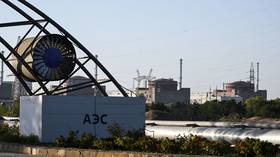Bank of England blames Brexit for excess inflation

Britain’s departure from the EU and the subsequent trade barriers have contributed to the inflation crisis in the country, Bank of England (BoE) policymaker Catherine Mann has claimed.
According to Mann, as cited by Bloomberg, there were signs that the cost-of-living crunch was beginning to abate in the US and the EU, but not yet in the UK.
All three had faced shocks to demand and supply driven by the “Covid and lockdown-induced global demand rotation and subsequent supply bottlenecks,” and the energy shock caused by Ukraine-related sanctions on Russia, Mann reportedly said on Monday at the Lamfalussy Lectures Conference in Budapest.
“However, the UK has also been affected by a third type of shock which makes it unique: no other country chose to unilaterally impose trade barriers on its closest trading partners,” she pointed out.
Mann’s comments come as inflation in the UK, which hit a four-decade high of 11.1% in October, has slightly cooled down to 10.5%, staying well above the BoE’s 2% target. Meanwhile, in the Eurozone, inflation has fallen back to 8.5%, while in the US it has declined to 6.5%.
Addressing inflation rates, Mann wondered: “Is there a turning point already visible in the data? For the US and the euro area, yes; for the UK, maybe stabilization.”
Last week, the BoE slashed its estimate of potential output, or the economy’s growth speed limit, to 0.7% for the next three years, blaming a “constellation of economic shocks” including Brexit. The figure is down from its 0.9% estimate in November.
The central bank has reiterated its predictions that the UK’s “level of productivity would be around 3.25% lower in the long run” because of its withdrawal from the EU free-trade area.
For more stories on economy & finance visit RT's business section














